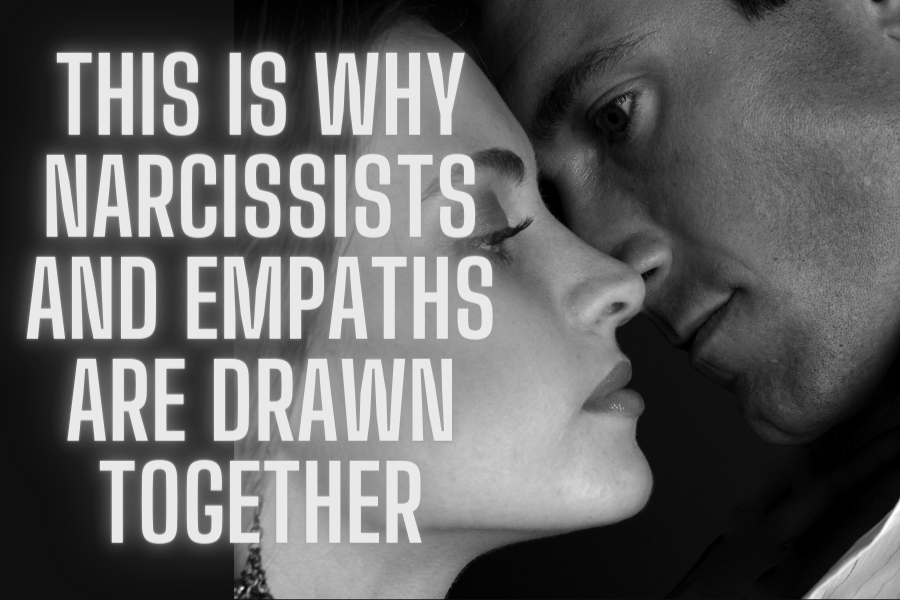Introduction
We’re so glad you decided to join us on this journey of exploration into two fascinating personality types – empaths and narcissists. It’s quite an unusual relationship dynamic we’re going to delve into, and we promise you, it’s not just intriguing, it’s educational too. We truly believe that understanding these dynamics can equip us to build healthier relationships in our lives.
To set the scene, let’s define our two protagonists. An empath, simply put, is a person who has an uncanny knack for understanding and feeling the emotions of others as if they were their own. They’re often the people who bring tissues to a sad movie because they know their friend will cry, even when that friend insists they won’t.
On the flip side, a narcissist is someone who has an inflated sense of their own importance and a deep need for excessive attention and admiration. They’re usually the person in the room who makes sure their achievements are the topic of conversation and, well, that they’re the center of attention.
What happens when these two distinct personalities come together? You might think it’s a recipe for disaster, but oddly enough, these two types are frequently drawn together. That’s what we’re going to explore in this article: Why is this so common? What’s the mechanism behind this peculiar attraction, and most importantly, how can we break the cycle if it turns out to be unhealthy? Stick with us as we take a deep dive into the curious world of empaths and narcissists.
Understanding Empaths and Narcissists

Ready to dive a bit deeper into our two leading roles – the empath and the narcissist? Great! Here we go.
Empaths
Empaths, bless their hearts, are like emotional sponges. They have a unique ability to feel and absorb other people’s emotions, which is simultaneously their superpower and their Achilles’ heel. Imagine walking into a room and instantly knowing that your friend is upset, even if they’re putting on a brave face. Sounds intense, right? That’s a day in the life of an empath.
Empaths are naturally compassionate, often putting others’ needs before their own. They’re great listeners, and they genuinely care about how others are feeling. However, because they feel so deeply, empaths can easily become overwhelmed and may need time alone to recharge.
Narcissists
Now, let’s move on to narcissists. Unlike empaths, narcissists tend to have an inflated sense of self-importance. They often see themselves as superior and believe they deserve constant praise and admiration. They have a knack for turning conversations toward themselves and their achievements. “Enough about you, let’s talk about me,” might be their unofficial catchphrase.
Narcissists are typically charming and charismatic, which is part of why they can be so appealing. However, this self-centeredness can make it difficult for them to genuinely empathize with others’ feelings and needs. This isn’t to demonize narcissists, though! Like everyone else, they’re a product of their environment, experiences, and brain chemistry.
Hopefully, this gives you a better understanding of our two main characters. But you might still be wondering, why would these two polar opposites ever be attracted to each other? Well, buckle up, because that’s what we’re going to unravel in the next section. Stay tuned!
The Attraction Between Empaths and Narcissists
You’ve made it to the juicy part – the curious dance of attraction between our empaths and narcissists. It’s a bit like watching a moth drawn to a flame. Intriguing, isn’t it? Well, let’s explore what fuels this connection.
Why empaths are drawn to narcissists
Firstly, our lovely empaths, with their hearts as big as the ocean, have an innate urge to heal. When they encounter a narcissist, their subconscious sees a project. Someone who needs their understanding, their compassion, and their unconditional love. A challenge, so to speak.
Secondly, the initial charm offensive of a narcissist can be incredibly appealing. Remember how we said narcissists tend to be charismatic? Well, they often shower their prospective partners with attention and admiration, making them feel incredibly special. And who doesn’t like to feel special?
Why narcissists are drawn to empaths
On the flip side, narcissists are instinctively attracted to empaths because they represent a continual source of the attention and validation they crave. The empath’s natural tendency to put others first and their genuine interest in other people’s emotions makes them an ideal audience for a narcissist’s self-centeredness.
Plus, empaths’ open-hearted understanding and willingness to forgive can act as a safety net for narcissists, allowing them to continue their self-focused behaviors without much pushback or consequence.
The Dynamics of the Empath-Narcissist Relationship

Just like a “thrilling” soap opera, isn’t it? Now, it’s time to delve into the nitty-gritty of the relationship between our empath and narcissist. What does their dance look like, and how does it change over time? Get ready for some plot twists!
Typical cycle of an empath-narcissist relationship
The idealization stage: Our story often begins with a ‘honeymoon phase.’ The narcissist adores the empath, showers them with praise, and makes them feel like they’re the only person in the world. The empath, in turn, is moved by this adoration and feels that they have finally found someone who truly appreciates their depth of feeling.
The devaluation stage: After some time, the winds change. The narcissist starts criticizing the empath, making them feel inadequate or overly sensitive. Remember, the narcissist’s need for attention and admiration is insatiable, and when the empath fails to meet these endless demands, the narcissist may react with disdain or indifference.
The discarding stage: Finally, the narcissist might grow bored or frustrated and decide to end the relationship. The empath, who has given their all in trying to ‘heal’ the narcissist, is often left feeling devastated and emotionally drained.
The psychological impact on both parties
Impact on the empath: This roller coaster of love and indifference can leave the empath feeling confused, used, and low in self-esteem. They may blame themselves for not being able to ‘fix’ the narcissist, not realizing that the issue lies within the narcissist’s inability to empathize and not their own lack of effort or care.
Impact on the narcissist: On the other hand, the narcissist may go on, seeking the next source of attention and validation, often without realizing the damage they’ve caused. They may not learn from this experience as their self-centered view may prevent them from recognizing their role in the breakdown of the relationship.
Breaking the Cycle: Strategies for Empaths

Recognizing the signs of a narcissistic relationship
The first step to solving a problem is recognizing that there is one. Are you constantly feeling drained, unheard, or less important in your relationship? Does the other person seem to always shift conversations back to themselves? If these situations seem familiar, you might be dealing with a narcissist. Acknowledging this is your first step towards healthier relationships.
Establishing and maintaining boundaries
Empaths have a natural tendency to put others’ needs before their own, but remember, you are equally important. Define your emotional, physical, and mental limits, and make sure the other person respects them. It’s okay to say no, and it’s necessary to take care of yourself too!
Strategies for self-care and emotional health
Find activities that help you recharge – a walk in the park, a relaxing bubble bath, reading your favorite book, or simply spending some quiet time alone. Self-care is not a luxury; it’s essential for your emotional wellbeing.
Seeking professional help if necessary
Remember, it’s okay to seek help. If you feel stuck in an unhealthy cycle, reach out to a counselor or a mental health professional. They can provide strategies and tools to cope, and sometimes, having a neutral person to talk to can be incredibly helpful.
Understanding the Narcissist: Insights and Intervention
Welcome back, you intrepid explorer of the human psyche! We’ve given a lot of thought to our empath friends, but let’s not forget about the narcissists. They’re a part of this puzzle too. Can they change? What help is available for them? Let’s be fair and look into their story as well.
Exploring the root cause of narcissism
It’s important to remember that narcissists aren’t villains twirling their mustaches; they’re individuals who’ve developed certain behaviors and attitudes due to a variety of factors – sometimes it’s upbringing, sometimes it’s past experiences, sometimes it’s just how their brain is wired. Understanding this can help us approach them with compassion instead of condemnation.
Methods and treatments for narcissists to manage their behaviors
Change is possible for everyone, even narcissists. It can be a challenging road, given that one of the hallmarks of narcissism is difficulty in recognizing one’s own faults. However, with professional help like therapy or counseling, a narcissist can learn healthier ways of relating to others and managing their need for validation.
Importance of professional psychological intervention
The role of professional help cannot be overstressed here. Mental health professionals are trained to navigate these complex issues and can provide guidance and strategies for change. If you or someone you know is a narcissist seeking change, reach out to a mental health professional.
There you have it, folks! Narcissists, like everyone else, are capable of growth and change. It might be a tougher journey for some, but with patience, understanding, and professional help, healthier patterns can emerge.
Conclusion
And here we are, dear reader, at the end of our enlightening journey exploring the complex dynamics between empaths and narcissists. You’ve done an incredible job sticking with us, and we hope this deep dive has provided you with valuable insights.
We’ve discovered that the pull between empaths and narcissists is a fascinating one, driven by contrasting needs and desires. The empath, with their big heart and desire to heal, is naturally drawn to the charismatic but emotionally needy narcissist. Yet, this can lead to a cycle of idealization, devaluation, and discarding that leaves both parties emotionally drained.
But remember, there’s hope for both empaths and narcissists. For empaths, recognizing the signs of a narcissistic relationship, establishing boundaries, prioritizing self-care, and seeking professional help can break the cycle and pave the way for healthier relationships. For narcissists, understanding the roots of their behavior and seeking professional intervention can help them to develop healthier ways of relating to others.
In closing, remember that understanding is the first step towards change. Whether you identify as an empath, a narcissist, or know someone who does, being aware of these dynamics is a big leap towards healthier, more fulfilling relationships.
Stay curious, stay compassionate, and keep growing. Life is a fascinating journey, and remember, we’re all learning along the way!
Further Reading and Resources
Exploring the dynamics between empaths and narcissists is quite the journey, isn’t it? But there’s always more to learn. So, here’s a little treat: some additional resources and support networks to keep you going.
Recommended books on understanding empaths and narcissists
“The Empath’s Survival Guide: Life Strategies for Sensitive People” by Judith Orloff – A fantastic resource for empaths looking to understand and protect their energy.
“Disarming the Narcissist: Surviving and Thriving with the Self-Absorbed” by Wendy T. Behary – This book provides valuable insights into dealing with narcissists and understanding their behavior.
Websites and online resources
Psychology Today – This site offers a wealth of articles on various psychological topics, including narcissism and empathy.
The Mindful Empath – A blog dedicated to providing resources and support for empaths.
Support networks and helplines
Mental Health America – A national organization offering support and resources for those dealing with mental health issues, including the challenges of being an empath or narcissist.
7 Cups – An online platform providing free, 24/7 emotional support via volunteer listeners.
With these resources in your toolkit, you’re well-equipped to continue this journey of understanding, growth, and healing. Remember, the world needs both empaths and narcissists – but most importantly, it needs understanding, compassion, and healthy relationships. So here’s to learning, growing, and becoming the best versions of ourselves.





